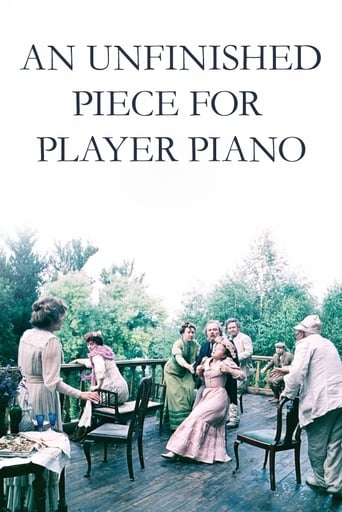Armand
meeting between Tchekov and Mikhalkov. so, a splendid moment. because this film is not exactly an adaptation. or support for one of a Russian image. it is a gem, fragile and delicate, precise and seductive, in which each piece is placed at perfect place. after the end, essential is its favor. gloomy stories, wise performance, the eyes of a child in middle of adults storm. change of sense and the dark clouds of revolution. fragility and need of guarantees. silhouettes of characters as shadows. and the games of normality who must cover the holes of reality. a film , like many by Mikhalkov, who represents only translation of a profound search of ideal in common reality. short - the story of Oblomov in different clothes.
ackstasis
'Unfinished Piece for Mechanical Piano (1977)' was adapted from Anton Chekhov's untitled play from 1878 (generally known as "Platonov" in English translations, after its main character). Of course, I didn't know that until I started writing this review. I must confess that my watching this film was motivated entirely by its unusual title, and that my experience with either Chekhov or director Nikita Mikhalkov was, until now, nonexistent. Having said that, I found the film quite enjoyable, and hope to enjoy more of Mikhalkov's work in the future. The story unfolds over the course of a single day and night, and plays a little like Renoir's 'The Rules of the Game (1939)' or Altman's 'Gosford Park (2001)' – that is, it depicts the upper-class, brought together by aristocracy, pretending to enjoy the company of those whom they secretly despise. The characters' conversations are stilted by formality, each person harbouring undisclosed hatreds and desires, leading fruitless lives of meaningless existence.Mikhalkov's film is very dialogue-heavy, and one might remark that nothing happens in it. Indeed, I believe that this is the point. Throughout the film, characters talk frequently about taking action, and yet achieve nothing. The prejudiced Darwinist and the proletariat sympathiser are both equally impotent. Sergey (Yuri Bogatyryov), in a moment of passion, pledges to leave the estate, but falls asleep in a stationary carriage. Even Platonov (Aleksandr Kalyagin) fails miserably in his suicide attempt, leaping into shallow water. Out of context, the film's ending might be misconstrued as optimistic, yet it smacks of superficiality; the assurance that "everything will be the way it was" indicates a return to the grotesque charade of formality that these people will spend the rest of their lives enacting. One gets the sense that only during Platonov's emotional break-down is a character in the film being truthful with himself or others. Alas, within insanity is the only sanity we're ever likely to find.
Dolly
A truly great film. Without cloying sentimentality, Mikhalkov portrays a village teacher and a doctor undergoing various stages of emotional breakdown, in this adaptation of the works by Anton Chekov. A village teacher believes his life has had no intent. Hence he is driven to despair and in effect to torment both himself and his young wife. The film's another protagonist - a doctor – hates his patients and his work. The guests staying with a general's wife, are talking about the delights of a simple village life, not really convinced by what they are saying. The classical style chosen by Mikhalkov and the masterful cinematography combine to make this film a real treasure for the lovers of Russian classics. Classical music ( by G. Donizetti, F. Liszt, and S. Rachmaninov ) proliferates throughout, adding to the unforgettable qualities of this captivating drama.
adelka_soba
If you read Anton Chekhov, you will not find this story in his plays. However, this film was made by Chekhov. If you love his works and if you are able to feel their spirit, you will love this wonderful film. Because the main intention was to feel and reproduce this unique atmosphere of Chekhov's works. Mikhalkov did it perfectly. I have to say, it's very hard thing as there are actually very few good films made by Chekhov's plays and later stories. Mikhalkov reproduced this boredom of insignificant people's lives and despair of the main character (Mikhail Platonov). Chekhov is my favorite author and I guess I know what is good and what is bad in those films by his works. If Chekhov's name isn't just a name for you, you HAVE TO get this film and watch it!!! It's the best film by Chekhov I've ever seen.



